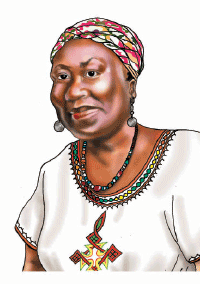Advocate. Noun. 1. A person who pleads another’s cause.
2. One who speaks or writes in support of something.
Last Monday evening in my reading group we were refreshed again by the story of Martin Luther and how he dared to take on the Church leaders in his day, challenging the Pope and the entire hierarchy on a host of what he considered unchristian practices, which he carefully summarised in 95 “theses” and nailed to the door of the church in Wittenberg (Germany). One major issue which incensed Luther was the sale of “indulgences” to the common people, a cunning way for the Catholic Church then to raise funds. Thus, the money which those poor folks needed so badly for daily living was used instead to purchase release from purgatory both for themselves and their loved ones. Luther saw no such teaching in the Bible which he had studied conscientiously, and therefore stood up to challenge this peddling of salvation and admission into God’s kingdom.
As if to ensure that the message was driven home more forcefully, I woke up the following morning to be directed to the story of a prophet named Jeremiah, a king named Zedekiah, and an ordinary man named Ebed-Melech. Jeremiah had been prophesying doom and captivity to the Israelites as a judgment for their abandonment of all that their God had commanded them to do. Certain princes of the land, afraid that the people’s spirits could be dampened and their hands weakened for war because of these discouraging prophecies, approached King Zedekiah and asked him to put Jeremiah to death. The king agrees and gives them the permission to do with the prophet as they please, whereupon they throw him into a mud-filled pit. End of story? Not at all! Along comes Ebed-Melech who goes straight to the king, accuses the princes of doing evil and pleads Jeremiah’s case quite simply: “He’s likely to die of hunger in the place where they’ve put him.” The king, surprisingly, asks him to take some men along with him and hasten to rescue Jeremiah before he dies.
One really must wonder at that king; a ruler who apparently has no mind of his own! A bunch of people come around and ask him to put a man to death and he immediately agrees; then another person shows up who tells him evil has been done to that same man and he’s just as quick to give his consent. Is there a lesson for us in this story? I believe so. For one, it makes us realise that nations have been finding themselves under the rule of terrible leaders for a very long time – maybe that should give us some comfort. How so undiscriminating and so uncritical can a leader be! That was at least understandable at a time when kingship passed from father to son, regardless of personal character or qualities; how about now when we are the ones who choose our own rulers? Should we open our korokoro eyes and continue to choose such people to lead us? Major elections are around the corner again; what are we going to do?
Other lessons from this story centre, of course, around the two camps of advisers. It is interesting that those who condemn the prophet are many – “the princes”. One wonders why evil people hardly operate singly; they are always in a group, scheming, plotting, one evil mind reinforcing the other. And weak leaders, like Zedekiah, love to surround themselves with them – milling around their principal as special assistants, chief special assistants, special advisers, chief special advisers on everything conceivable and struggling to outdo each other in coming up with the most innovative ideas to hoodwink the populace as well as deal with those they consider as enemies. For those who know the biblical story of Daniel, the same scenario plays out clearly.
The second camp is actually a one-man camp – Ebed-Melech. What is interesting about this man is that he is a servant in the king’s palace (a eunuch; that is, a castrated man put in charge of the king’s harem or charged with overseeing the king’s chamber) and a foreigner in Israel – an Ethiopian. So, he was twice an underdog. And yet he dared to confront the king over an injustice done to someone who probably did not know him from Adam! What special interest could he have had in Jeremiah as a human being? He didn’t come from his village, nor were they members of the same social club or political party. All he cared about was that there was a human being to whom injury had been done, and that was enough for him to speak out on the prophet’s behalf. The voice of truth hardly rings out in a group.
I wonder, are there any Ebed-Melechs in our high places today; people who have access to our rulers (as servants, drivers, orderlies, or even former schoolmates and colleagues) and who would find in themselves the boldness to speak the truth to them and be a voice for the oppressed in the land? One individual can make a world of difference. Who knows, after all the “princes” have done their worst, maybe an Ebed-Melech would just come along and turn everything around for someone who is desperately in need. Ebed-Melech, may your tribe increase!











